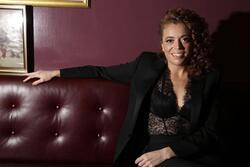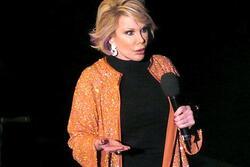Jenny Slate's "Stage Fright"
Jenny Slate is a funny Jewish woman. The end. Thanks for coming folks, byeeee!
I’m just messing with you. But I was dead serious about that first part: Jenny Slate is a funny Jewish woman. This has never been more evident than in her newest Netflix special, Stage Fright, which is part stand-up comedy, part documentary. While “funny” might be the first word I’d use to describe this special, the second word I’d use is “generous.”
Many comedians weave their personal experiences into their comedy, but few bare their souls as completely as Slate does in her special. In addition to countless funny bits like: “When I was younger I looked almost exactly like Anne Frank, and I was incredibly stuck up about it;” or, “I don’t know if anyone here is a sucker like me and does those barre classes where you’re supposed to sculpt your clit into an ancient arrowhead or whatever;” and, “The synagogue I went to as a kid looked like a Chinese restaurant from the 70s with no windows...” Slate gets real about her family, her fears, her divorce, and much more.
Stage Fright is really a Slate family affair. In between segments of pure stand-up are documentary-style scenes in which Slate talks to her parents, her two sisters, and her two grandmothers. Watching the documentary portions, you start to realize that Slate isn’t just giving us a window into where her jokes come from; she’s giving us a window into where she comes from. In one of my favorite moments, Slate gives us a tour of her grandmother’s closet. She pulls out an Oscar de la Renta nightgown and, turning to the camera, says: “Nana Connie’s not sleeping in bullsh*t.” This leads into a very sweet montage of Slate trying on and modeling some of Nana Connie’s dresses, much to her mother and grandmother’s delight. I felt privileged to witness this intimate family moment among three generations of women, and grateful to Slate, and her family, for their willingness to share it with the world.
The fact that Slate is so giving of herself in Stage Fright—that she introduces us to her family, that she sits with us as she reads from slips of paper in a box labeled “things that make me mad” from her teenage years, that she takes us on a tour of her childhood bedroom—makes sense when she explains the special’s namesake. When talking about the source of her stage fright, she says, “Right before I go onstage I’m presented with this essential question: Will they like me? And I know that they will once I start to talk, but I don’t earn the love unless I give something beautiful that goes out. So my stage fright comes from a deeper thing of exchange.”
Sorry, just had to go ugly cry in a corner for a sec. I’m back now. So, Slate’s stage fright—at least my interpretation of how she describes it—is rooted in fear that she might not give enough and that what she does give may not be worthy of love.
As Slate discusses her stage fright, my thoughts turn to the experience of womanhood. Women are socially conditioned to be givers and also to think that we can never give enough, or be enough. I mean, Shel Silverstein’s The Giving Tree was definitely an allegory about the relationship between women and the patriarchy, right? The tree (aka the woman) gives everything she has to the little boy (aka the patriarchy). At the very end when she’s quite literally given everything she can possibly give, he returns to ask for more. Instead of saying, “I’ve given you everything I have. Go away you greedy bastard,” she’s like, “Come sit on my face. It’s fine.”
Ok, I’ve gotten us into a deep, dark hole here, and I’m not quite sure how to get us out. It’s always a bit jarring when comedy spurs us to delve into really serious issues, right? You show up for some laughs but walk away with so much more than you bargained for.
Here’s how I’ll bring us out: Stage Fright is an awesome comedy special and you should watch it. It’s honestly really difficult to write about Slate’s comedy because so much of what makes it great is the layering she adds with her voice, her posture, her timing, and her body movements. I can’t do it justice in a blog post. You’ll laugh, you’ll think, you might cry, and I believe you’ll feel gratitude for Slate’s generosity and vulnerability. Let’s all commit to being more aware of the pressure on women to give of themselves, and to work on not asking for quite so much.







